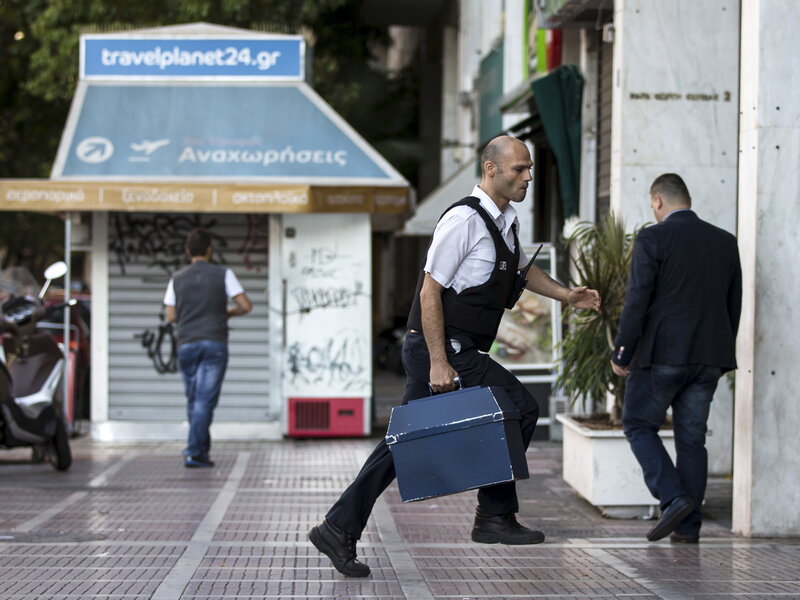This was mentioned by David Wilcock in his interview on OYM.
Greece Bank Run Empties Over A Third Of ATMs Of Cash
By George Georgiopoulos and Lefteris Papadimas
ATHENS, June 27 (Reuters) – More than a third of automated teller machines across Greece ran out of cash on Saturday before they were replenished as Greeks pulled out money on fears their country was set to crash out of the euro, three banking sources said.
Anxious Greeks lined up outside ATMs after Prime Minister Alexis Tsipras made a surprise call for a referendum on austerity terms demanded by lenders, throwing talks with lenders in disarray and putting Greece on the verge of a default.
About 35 percent of the ATM network – some 2,000 out of the 5,500 ATMs across Greece – ran out of euro banknotes at one point during the day and were being replenished, the bankers said. Banks were working in coordination with the central bank to keep the network fed with cash, they said.
Replenishing ATMs usually takes one to two hours per ATM, leading to the long lines, one banking source said.
Around 600 million euros was withdrawn from the banking system on Saturday, one senior banker at one of Greece’s four big lenders told Reuters. A second banker estimated the outflow at more than 500 million euros.
Though that was below the level of over 1 billion euros seen on some days over the past two weeks, the figure was almost exclusively from ATM withdrawals, where the average daily limit of cash that can be taken out is 600 to 700 euros, bankers said.
“Demand for cash is definitely higher than what you see on a normal Saturday,” one of the bankers said.
“This does not mean that there are lines everywhere but we are trying to keep ATMs fed with banknotes.”
Minutes after Tsipras’s address to the nation, small lines could be seen at some ATMs in Athens. In addition to lines at various ATMs across the country on Saturday, a line of about 40 people could be seen at an ATM inside the Greek parliament.
Greece’s government has insisted that banks will reopen as normal on Monday and denied the country will have to impose capital controls to prevent the banks collapsing.
The banks depend on emergency liquidity from the European Central Bank to stay open, and senior government officials held talks with the ECB chief Mario Draghi on Saturday to ensure continued support to banks amid the crisis. (Writing by Deepa Babington; editing by Ralph Boulton)
Greece To Close Banks, Impose Capital Controls Amid Looming Default

A security worker brings money to a National Bank branch in Athens on Sunday. Greeks have been withdrawing euros in anticipation of a possible default on the country’s debt payments early next week.Marko Djurica/Reuters/Landov
Updated at 2:40 p.m. ET
Greece’s Prime Minister Alexis Tsipras announced Sunday that banks will be closed and capital controls imposed in order to stave off a run on the euro after negotiations with the country’s international lenders broke down.

He said the Athens stock market would also be closed.
However, Tsipras blamed the European Central Bank for the latest crisis after it decided not to increase the amount of emergency liquidity amid a run on the banks that saw people lined up at ATMs, many of which ran dry amid the onslaught.
“It is now more than clear that this decision has no other aim than to blackmail the will of the Greek people and prevent the smooth democratic process of the referendum,” Tsipras said in a televised address to the Greek people, according to The Associated Press.
“[Rejection] of the Greek government’s request for a short extension of the program was an unprecedented act by European standards, questioning the right of a sovereign people to decide,” he said.
“This decision led the ECB today to limit the liquidity available to Greek banks and forced the Greek central bank to suggest a bank holiday and restrictions on bank withdrawals,” Tsipras said, without elaborating on how long the bank holiday would continue.
On Saturday, Tsipras called for a national referendum on July 5 to decide the fate of a bailout package hammered out in negotiations led by Germany, the home of the ECB and the grouping’s strongest economy. Finance ministers with the European Union have rejected the surprise vote.
The premier’s remarks also come as the country’s opposition leader, Antonis Samaras, called for Tsipras to scrap the referendum and form a government of national unity.
A default on a 1.6 billion euro ($1.9 billion) debt due the International Monetary Fund on Tuesday could presage an exit from the eurozone and a return to a heavily devalued version of Greece’s former currency, the drachma.
As Joanna Kakissis reports from Athens for NPR: “Some European leaders say the Greek government closed the door on negotiations by calling a referendum. Others are pushing for a compromise to preserve the euro.”
As The New York Times reports:
“The central bank’s 25-member governing council, convened by conference call, was discussing how and whether to extend an emergency line of credit — currently worth more than 85 billion euros, or $95 billion — that in recent weeks has kept Greek banks from collapsing.
“Analysts say that without these funds, Greek banks would not have sufficient money to provide to panicky savers if they opened on Monday. Without a continued flow of money to consumers and businesses, Greece’s struggling economy would probably lapse deeper into recession.”
U.S. Treasury Secretary Jack Lew called IMF Managing Director Christine Lagarde and the finance ministers of Germany and France, urging them to “find a solution that puts Greece on a path toward reform and recovery within the Eurozone,” according to a statement.
Sources:
http://www.huffingtonpost.com/2015/06/27/greece-bank-run_n_7678858.html


Leave a Reply